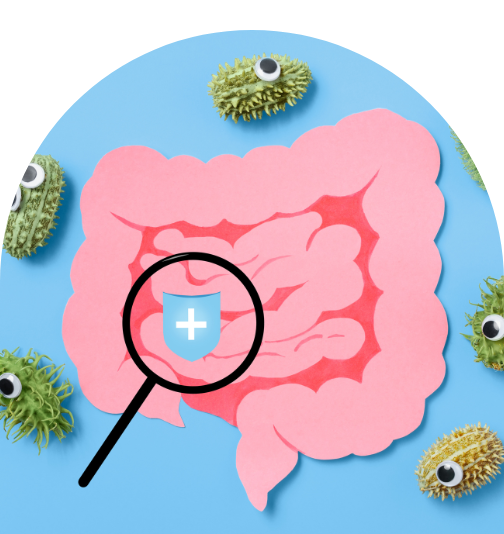Discover What Microbiome Testing Is, What It Reveals & How To Use the Results To Improve Your Chance of Conception
When it comes to fertility, most people focus on reproductive organs and hormones. However, emerging research suggests that gut health may play a vital role in fertility for both men and women(1).
The gut-fertility connection offers couples struggling with unexplained infertility new hope in creating the family they desire. Gut health tests can reveal exactly what’s going on inside the microbiome, including bacterial overgrowth, toxic burdens, nutrient deficiencies, and other root causes potentially blocking conception. These insights can then guide you in making appropriate lifestyle, nutrition, and environmental changes to improve your chances of getting pregnant naturally.
The Gut-Fertility Connection
The human gut is home to trillions of microorganisms, including bacteria, fungi, and viruses, collectively known as the gut microbiome. This complex ecosystem plays a critical role in various aspects of health, including digestion, immune function, and even reproductive health.
Recent studies have shown that an imbalance in the gut microbiome, known as gut dysbiosis, can contribute to chronic inflammation, which may negatively impact fertility. Inflammation can interfere with the production and regulation of reproductive hormones, such as estrogen and progesterone, and may also affect the quality of eggs and sperm(2).
The gut microbiome also influences the body’s ability to absorb and utilize essential nutrients, such as fatty acids, folate, iron, and vitamin D, which are crucial for reproductive health(3). Poor gut health may lead to nutrient deficiencies, further compromising fertility.
While it’s hard to truly pinpoint how many people struggle with dysbiosis, a 2016 study found that 40% of the general population had some form of functional gastrointestinal disorder, which is often associated with gut dysbiosis(4). So this is a pretty common imbalance—and the symptoms can be subtle.
Dysbiosis symptoms can include:
- Digestive issues – Bloating, gas, diarrhea, constipation/hard-to-pass stool, abdominal pain or discomfort
- Mood disorders – Anxiety, depression, irritability, mood swings
- Skin problems – Acne, eczema, rosacea, psoriasis
- Autoimmune conditions – Rheumatoid arthritis, lupus, multiple sclerosis (MS), Hashimoto’s thyroiditis
- Nutritional deficiencies – Due to poor nutrient absorption
- Fatigue – General feelings of tiredness and lethargy
- Food sensitivities, intolerances, or allergies – Difficulty digesting certain foods or development of new food sensitivities
- Sugar cravings – Due to an overgrowth of yeast, harmful bacteria, or even parasites
- Bad breath – Caused by an imbalance of oral bacteria
- Weakened immune system – Frequent infections, colds/flus, or slow wound healing
Note: You do not need to have all these signs to have dysbiosis! Many of these symptoms can also indicate other health challenges. Traditional healthcare systems don’t have the same tools functional health practitioners do, making it difficult to truly understand (and diagnose) what’s going on inside your body by looking at the symptoms alone.
Gut Microbiome Testing
Thankfully, functional testing allows you to see what’s going on inside your gut microbiome. A comprehensive stool test is a powerful tool that can provide valuable insights into the health and diversity of your gut bacteria. The test typically involves providing a stool sample, which is then analyzed in a laboratory to identify the types and quantities of bacteria present.
A gut microbiome test can reveal:
- Bacterial Diversity
The gut microbiome is a complex community of microorganisms living in our digestive tract. It consists of trillions of microbes, primarily bacteria from hundreds of different species, along with fungi and viruses.
A diverse gut microbiome is generally considered a sign of good gut health(5). A lack of diversity may indicate an imbalance or the presence of harmful bacteria, which can contribute to inflammation and other health issues that may impact fertility.
Factors that contribute to a gut microbiome imbalance include poor diet/nutrition, stress, environmental toxins, and chronic infections. Once you know the composition of your microbial community, specific protocols and lifestyle shifts can be recommended to get them back into harmony.
- Specific Bacterial Strains
A gut test can also look at the specific “residents” inside your microbiome. Certain bacterial strains have been associated with improved fertility outcomes. For example, Lactobacillus and Bifidobacterium species are known to support a healthy vaginal microbiome, which is essential for conception and maintaining a healthy pregnancy(6). A gut microbiome test can identify the presence and abundance of these good bacteria.
Some bacteria, such as Escherichia coli (E. coli) and Clostridium difficile (C. diff), can be harmful when present in high numbers. These bad bacteria can cause inflammation and disrupt the balance of the gut microbiome, potentially impacting fertility. Research is now showing that high numbers of harmful bacteria can also negatively impact the success of assisted reproductive technologies (ART), such as in vitro fertilization (IVF)(6).
- Pathogenic Parasites & Viruses
In addition to bacteria, your gut microbiome can also be home to parasites and viruses. And guess what—you do not need to live in, or have visited, a developing country to pick up parasites! Many Americans have parasites buried deep in their digestive tract, often from the food we eat and the water we drink, not knowing they’re there until they show up on a gut test. Certain viruses, such as noroviruses and adenoviruses, can also appear on gut test results.
Here’s something critical to know… many people who carry pathogenic parasites or viruses present with zero symptoms! Yet, at a systemic level, your body is busy trying to fight these invaders off instead of directing energy toward getting pregnant.
- Yeast Overgrowth
A gut microbiome test can detect the presence and quantity of yeast in the digestive tract. An overgrowth of yeast, particularly Candida albicans, can lead to a condition called candidiasis. Candidiasis has been associated with reduced fertility in both men and women(7).
- Immune Response
Microbiome tests can also show how well your body’s immune system is working by measuring specific proteins in your stool. For instance, secretory IgA is an antibody that helps protect your gut lining and fight off harmful bacteria and viruses, while anti-gliadin IgA can show if your body is reacting negatively to gluten. Eosinophil activation protein and calprotectin are two other proteins that, when found in high amounts, can indicate inflammation in your gut, which may be caused by conditions like inflammatory bowel disease (IBD) or parasitic infections.
Making Changes Based on Gut Microbiome Test Results
Once you have the results of your gut microbiome test, you can work with your functional medicine practitioner or functional fertility specialist to develop a personalized plan to improve your gut health and, consequently, your fertility.
Here are some strategies that may be recommended based on your test results:
- Probiotics
Probiotics are beneficial live bacteria that can help restore balance to the gut microbiome. If your test reveals a lack of diversity or low levels of beneficial bacteria, a high-quality probiotic supplement or probiotic-rich foods, such as yogurt, kefir, sauerkraut, and kimchi(8) may be recommended. Because we can see the exact bacterial strains—and their quantities—in a microbiome test, a functional health expert can create a custom-tailored protocol to get those specific “good” bacteria to optimal levels.
- Prebiotics
Prebiotics are non-digestible fibers that serve as food for beneficial gut bacteria. Remember, probiotics are live organisms, which means they need to eat! Consuming prebiotic-rich foods, such as garlic, onions, leeks, asparagus, and bananas, can help support the growth and activity of good bacteria in the digestive system(9).
- Dietary Changes
Dietary changes may be recommended based on your gut microbiota composition. For example, if your test reveals an overgrowth of yeast, you may be advised to reduce your sugar and refined carbohydrate intake, which can feed yeast growth(10).
If pathogenic bacteria are present, you may be advised to avoid certain foods that can promote their growth, such as processed meats and high-fat dairy products(11). A balanced diet rich in whole grains, fruits, vegetables, and lean proteins can help support a healthy gut microbiome.
- Stress Management
Chronic stress can negatively impact gut health and fertility(12). If your test results suggest that stress may be a contributing factor to gut dysbiosis, it’s wise to implement stress management techniques, such as meditation, yoga, or deep breathing exercises.
- Sleep Hygiene
Poor sleep quality and quantity can also disrupt the gut microbiome and negatively impact fertility(13). You can improve your sleep hygiene by establishing a consistent sleep schedule, creating a relaxing bedtime routine, and ensuring your sleep environment is conducive to restful sleep.
- Nutrient Supplementation
If your test indicates poor digestive function or nutrient deficiencies, your functional health practitioner may recommend specific nutrient supplements to support reproductive health. For example, fatty acids, folate, iron, and vitamin D are essential for fertility and fetal development(14).
But you don’t want to choose any old supplement brand. It’s much better to choose pharmaceutical-grade supplements, which are backed by clinical studies and extensive research. Many cheap brands or those found on big box store shelves are full of fillers or low-quality ingredients. When it comes to supporting your health and fertility goals, it’s important to remember that this is a long-term journey. Don’t compromise on the quality of the supplements you choose, as they play a vital role in your overall well-being.
Conclusion
The connection between gut health and fertility is a fascinating and growing area of research. A gut health test can provide valuable insights into the health and diversity of your gut microbes, which can guide you in making appropriate changes to improve your chances of getting pregnant naturally.
By working with a functional fertility specialist to interpret your test results and develop a personalized plan, you can take proactive steps to support your gut health and fertility. This may include incorporating probiotics and prebiotics into your diet, making dietary changes, addressing nutrient deficiencies, managing stress levels, and improving sleep hygiene.
Remember, while gut health plays an important role in fertility, it is just one piece of the puzzle. A comprehensive approach to fertility should also address other factors, such as reproductive health, hormonal imbalances, and overall healthy lifestyle choices.
If you are struggling with fertility issues, we can help you navigate this complex issue and develop a holistic plan to support your reproductive health and well-being. By addressing the root cause of your fertility issues, including gut health, you can give yourself the best chance of achieving a healthy pregnancy.








